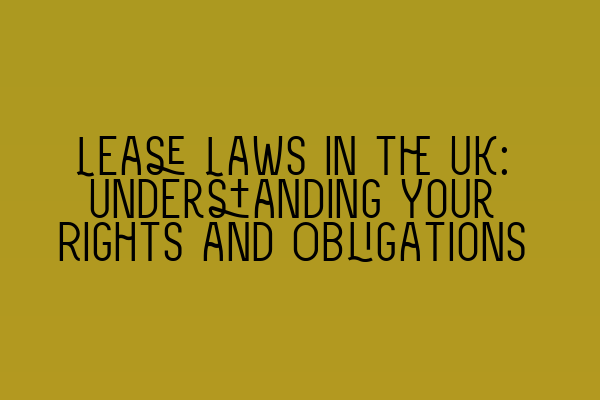Lease Laws in the UK: Understanding Your Rights and Obligations
As an individual or business owner who leases property in the UK, it is essential to have a comprehensive understanding of lease laws to protect your rights and ensure compliance with your obligations. A lease is a legal contract between a landlord and a tenant that outlines the terms and conditions of the rental agreement, including the rights and responsibilities of both parties.
Understanding the lease laws in the UK can help you navigate the complexities of your lease agreement and make informed decisions. In this article, we will explore some key aspects of lease laws and provide valuable insights for tenants and landlords alike.
1. Types of Leases
There are various types of leases in the UK, including assured shorthold tenancies, assured tenancies, and contractual tenancies. Each type of lease has different rights and obligations attached to it, so it is crucial to determine the specific type of lease you have before proceeding.
To identify the type of lease you hold, review your tenancy agreement or seek legal advice. Understanding your lease type will enable you to understand your rights as a tenant or landlord and fulfill your obligations accordingly.
2. Rights and Obligations of Tenants
As a tenant, it is important to be aware of your legal rights and responsibilities. Your rights as a tenant may include:
- The right to live in a safe and habitable property
- The right to privacy
- The right to have your deposit protected in a government-approved tenancy deposit scheme
- The right to be informed about any changes in rent or other terms of the lease
On the other hand, tenants have certain obligations, such as:
- Paying rent on time
- Taking care of the property and keeping it clean
- Not causing damage to the property
- Not causing disturbances to neighbors
By understanding your rights and obligations as a tenant, you can maintain a harmonious relationship with your landlord and ensure a smooth tenancy.
3. Rights and Obligations of Landlords
Landlords also have specific rights and obligations under lease laws in the UK. Some common rights of landlords include:
- The right to receive rent on time
- The right to access the property for inspections or repairs with proper notice
- The right to take legal action in case of rent arrears or damages to the property
However, landlords also have obligations, such as:
- Ensuring the property is safe and meets all legal requirements
- Protecting the tenant’s deposit in a government-approved scheme
- Providing the tenant with proper notice before making any changes to the lease agreement
By understanding their rights and obligations, landlords can manage their properties efficiently and avoid any legal complications.
4. Dispute Resolution
In case of any disputes between landlords and tenants, it is advisable to resolve them amicably whenever possible. However, if a resolution cannot be reached, there are legal avenues available for both parties.
Tenants and landlords can seek legal advice or contact relevant authorities, such as the housing department or the Property Ombudsman, for guidance and intervention. Understanding the dispute resolution process can help expedite resolutions and minimize potential damages.
If you need assistance with any lease-related issues, seeking legal advice from experienced property solicitors is highly recommended. They can provide valuable guidance and ensure your rights are protected.
For further preparation on legal matters, consider exploring the following resources:
- SQE 1 Practice Exam Questions
- SQE 1 Practice Mocks FLK1 FLK2
- SQE 2 Preparation Courses
- SQE 1 Preparation Courses
- SRA SQE Exam Dates
By staying informed and understanding your rights and obligations under lease laws in the UK, you can navigate the rental landscape confidently and protect your interests.
